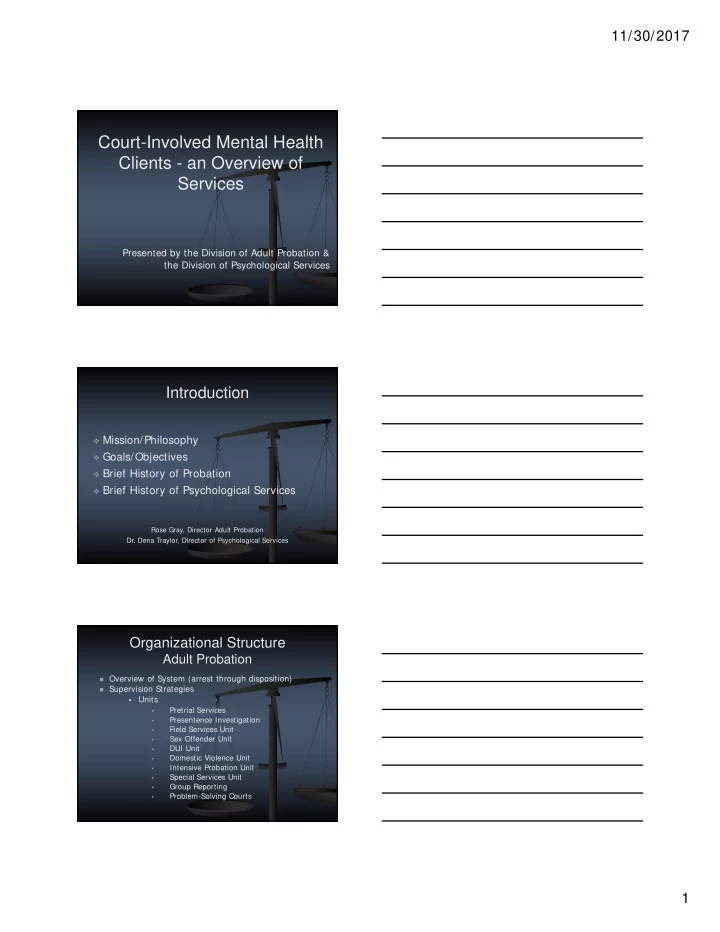

11/30/2017 Court-Involved Mental Health Clients - an Overview of Services Presented by the Division of Adult Probation & the Division of Psychological Services Introduction Mission/Philosophy Goals/Objectives Brief History of Probation Brief History of Psychological Services Rose Gray, Director Adult Probation Dr. Dena Traylor, Director of Psychological Services Organizational Structure Adult Probation Overview of System (arrest through disposition) Supervision Strategies Units Pretrial Services Presentence Investigation Field Services Unit Sex Offender Unit DUI Unit Domestic Violence Unit Intensive Probation Unit Special Services Unit Group Reporting Problem-Solving Courts 1
11/30/2017 Adult Probation Programs Include: STOP Program (Supervised Treatment Opioid Program) Cognitive Restructuring Groups Volunteer Program Gender Specific Program Motivational Interviewing Grant Programs BHTCC (Behavioral Health Treatment Court Collaborative) Redeploy Case Management Intake Case Planning Court and Community Partners Collaboration Essential for the development of community behavioral health services. Includes: Psychological Services Treatment Providers Coordination of Community Treatment Options Identification of Gaps in Services Division of Psychological Services Overview of Division/History In 1988 the Division of Psychological Services was created following a Lake County Court Services Division study recommending that “an in-house unit be created to provide diagnostic and treatment services to the adult and juvenile courts.” The Division’s services are unique compared to other Illinois Circuit Courts. 2
11/30/2017 Goals To provide accurate psychological evaluations and reports, expert testimony, and sound recommendations as requested by court. To provide comprehensive assessments for criminal offenders. To provide evidence-based treatments for adult and juvenile offenders. To facilitate continuing education programs for courts and community. Services and Programs Psychological Assessments Court Referrals Fitness to Stand Trial/Plead Evaluations Pre-Plea, Pre-Sentence, Problem-Solving Courts Sex-offender Evaluations Probation Referrals Adult and Juvenile Average 500-600 evaluations per year Services and Programs (con’t.) Counseling Services - Individual Adult (including those involved with Problem- Solving Courts) Juvenile - Family counseling services for juvenile probationers and their families - Case Management for Mental Health Court clients 3
11/30/2017 Groups Groups Anger Management Parenting Skills Women FIRST (Focus, Information, Resources, Skills, Time) Seeking Safety Assist probation staff conducting Cognitive Outreach Groups (COG) Community Resource Liaisons - Coordinate referrals for adult and juvenile probation clients to community treatment agencies - Build relationships and maintain communication with service providers - Oversee service contracts with community agencies - Assist LCHD with Medicaid sign up for eligible probationers through the ACA The FACE IT Program Families and Community Engaged in Treatment - Residential treatment for delinquent males ages 13-18 - Uses interventions based on evidence-based practices - Provides counseling, schooling and basic needs for up to 12 youths Goal is to enable youths to function productively and reduce recidivism. 4
11/30/2017 FACE IT Services Families and Community Engaged in Treatment Treatment provided by clinical staff of Psychological Services. Includes: Trauma-Focused Cognitive Behavioral Therapy Individual Therapy Family Therapy Life Skills Group Process Group Recovery Skills (24 week curriculum) COG Other Services Provided Trauma-Informed Care Training Fees for Service (January 2012) Anger Management COG Domestic Violence Assessments Jr’s Challenge Over $86,000 collected since January 2012 Juror Stress Program Provide critical incident debriefings for jurors traumatized by jury duty Crisis Intervention and Suicide Risk Assessment for Probationers in Crisis Internship/Practicum Training Program 5
Recommend
More recommend